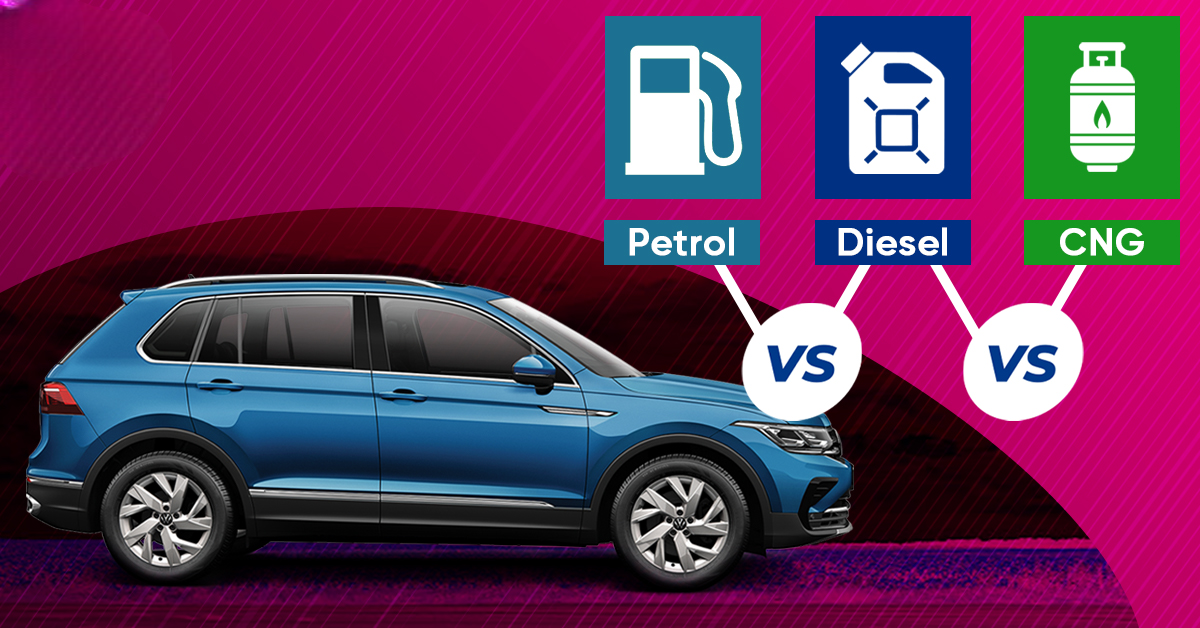In 2025, buying a car in India has become more confusing than ever. There are many fuel options – CNG, Petrol, and Diesel. Each one has its own benefits and drawbacks. With rising fuel prices, stricter emission rules, and changing car technology, it is important to know which fuel type is right for you.
In this article, we will compare CNG, petrol, and diesel car in simple words. You will learn about the cost, mileage, maintenance, performance, and long-term value of each option. By the end, you will know which fuel is best for your needs.
Overview Table: CNG vs Petrol vs Diesel Car (2025)
| Feature | CNG Cars | Petrol Cars | Diesel Cars |
| Fuel Cost (per km) | ₹2 – ₹2.5 | ₹5 – ₹6 | ₹4 – ₹5 |
| Mileage | 25 – 30 km/kg | 16 – 20 km/litre | 20 – 25 km/litre |
| Initial Cost | Slightly higher than petrol | Lowest | Higher than petrol & CNG |
| Maintenance Cost | Moderate | Low | High |
| Engine Performance | Lower | Smooth and responsive | High torque |
| Boot Space | Less (due to CNG tank) | Full | Full |
| Long-Term Use | Best for daily city drive | Good for low to medium usage | Best for long highway trips |
| Pollution Level | Lowest | Moderate | Higher |
| Availability | Growing fast in cities | Widely available | Limited in new car sales |
CNG Car in 2025: Good for Savings, Not for Speed
CNG (Compressed Natural Gas) cars have become popular in cities like Delhi, Mumbai, and Ahmedabad. CNG is cheaper than petrol and diesel. The running cost is almost half compared to petrol. This makes CNG cars the best choice for people who drive daily in the city, such as office-goers or cab drivers.
Pros of CNG cars:
- Low running cost
- Environment-friendly (low pollution)
- Government support for more CNG stations
Cons of CNG cars:
- Lower power compared to petrol/diesel
- Less boot space due to the gas cylinder
- Not ideal for long highway drives
Best for: Daily city drivers who want to save money.
Petrol Car in 2025: Simple, Affordable, and Trusted
Petrol cars are the most common in India. They are cheaper to buy, need less maintenance, and have smoother engines. In 2025, many small cars and compact SUVs still come with petrol engines.
Pros of petrol cars:
- Low purchase price
- Easy to maintain
- Smooth performance in the city
Cons of petrol cars:
- Fuel is expensive (₹100+ per litre in many cities)
- Lower mileage than diesel and CNG
- Emits more carbon than CNG
Best for: People who drive less than 1,000 km per month and want a simple car.
Diesel Cars in 2025: Power with High Mileage
Diesel cars offer great mileage and more torque (power), which is good for long highway travel and heavy load. However, due to BS6 emission norms and high diesel vehicle tax in some cities, their popularity has decreased. Many brands have stopped making diesel models.
Pros of diesel cars:
- High fuel efficiency
- Powerful engine performance
- Best for long drives and highways
Cons of diesel cars:
- Higher price than petrol cars
- More expensive maintenance
- Pollution is more than CNG or petrol
- Government may limit diesel in future
Best for: People who drive more than 2,000 km per month or travel on highways regularly.
Which Fuel Type is Best in 2025?
It depends on your daily usage, location, and budget. Here is a simple guide:
- Go for CNG if you drive daily in a city and want to save money in the long run. It’s best for office workers, delivery agents, and budget-conscious families.
- Choose Petrol if you use your car occasionally, live in a small town, or want a low-cost, hassle-free car.
- Pick Diesel if you do a lot of highway driving, travel between cities, or need more power for long trips.
Final Thoughts
In 2025, all three fuel types – CNG, petrol, and diesel – have their place. The Indian government is also encouraging electric and hybrid vehicles, but for now, these three options remain dominant. If you want low cost and eco-friendliness, CNG is ideal. If you want flexibility and low maintenance, petrol is still a safe bet. If you want performance and long-distance power, diesel is the one.

